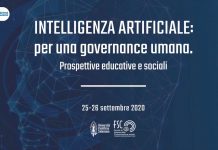Abstract dell’intervento
The use of Artificial Intelligence as a mechanism to improve health care, democratize the access and promote equity of global health, generating social assets. This is the main focus given by Professor Ricardo Valentim during his lecture, Artificial Intelligence: for human governance. Educational and social perspectives, which is the main focus of the Laboratory of Technological Innovation in Health – LAIS/UFRN. The experience developed in LAIS is based on the delivery of products to society, which have direct application in the resolution of problems in the health area. Because of this reason, researches are made with biosensors, aiming the improvement of diagnosis of prostate and breast cancer, bone and syphilis diseases, among others. The work has as one of its objectives to increase the productivity of public health, with technology of high added value and more comprehensive scale for the care, attractive also for the private sector and the health industry.
Intervento nel Convegno – SOCIETÀ Sabato 26 settembre ore 9.15 – 13.00
Breve biografia
Federal University of Rio Grande do Norte (UFRN)
Ricardo Alexsandro de Medeiros Valentim, PhD in Electrical and Computer Engineering
PhD in Electrical and Computer Engineering from the Federal University of Rio Grande do Norte (UFRN). Adjunct Professor IV of UFRN Permanent Professor of the Postgraduate Program in Electrical and Computer Engineering (PPgEEC/UFRN). He is also a permanent professor in the Professional Master in Health Teaching in the Department of Medicine. He is the Head of the Research and Technological Innovation Management Sector of the Onofre Lopes University Hospital (HUOL) at the Brazilian Hospital Services Company (EBSERH), Information and Communication Technology Coordinator at the Distance Education Secretariat (SEDIS/UFRN).He has experience in Computer Science, with emphasis on Health Information Systems, working mainly with Health Technology Innovations, Telemedicine and Telehealth, Hospital Automation, Assistive Technologies and Educational Technologies.






